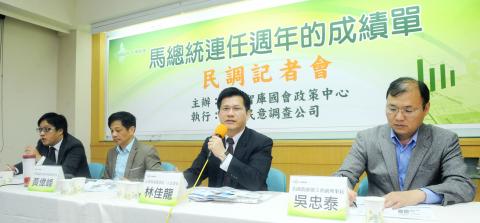|
People have given up
on Ma, poll says
LAME DUCK: A Taiwan Thinktank survey found that
Ma’s approval rating had dropped to 19.1%, with 69.9% saying that they were
dissatisfied with his performance
By Chris Wang / Staff reporter

Democratic Progressive Party
Legislator and Taiwan Thinktank president Lin Chia-lung, center, speaks at a
press conference held yesterday to evaluate the performance of President Ma
Ying-jeou one year after his re-election.
Photo: Wang Min-wei, Taipei Times
President Ma Ying-jeou (馬英九) has become a
lame duck president with persistent low approval ratings and people have given
up hope in him, academics said yesterday, after the results of a recent opinion
poll were released.
Ma’s approval rating has dropped to a record-low 19.1 percent, and 60 percent of
respondents said they did not expect a better performance from Ma in the
remainder of his second term, the poll showed.
The survey, conducted by Taiwan Thinktank, polled respondents on Ma’s
performance, as well as their views on public policies, such as the national
referendum on the Fourth Nuclear Power Plant, the 12-year compulsory education
system and pension reform.
The survey found Ma’s approval rating was a dismal 19.1 percent, the lowest
since the think tank began conducting a monthly tracking poll in March last
year, and 69.9 percent of those polled said they were unsatisfied with his
performance.
On a scale of one to 10, Ma only received a passing score of 5.19 on personal
integrity and scored no more than 3.76 in the other five categories:
understanding people’s needs, government personnel, promoting the economy,
promoting social justice and safeguarding the nation’s sovereignty.
Overall, Ma scored 3.66 for his performance over the first year of his second
term, the survey found.
Asked whether they expected Ma to do better in the remaining three years of his
term, which began on May 20 last year, 60 percent of the respondents said ‘no,’
with only 28.8 percent saying that they still have hope.
“In general, Ma has been an arbitrary ruler in domestic affairs and a soft
leader in external affairs,” Taiwan Thinktank president Lin Chia-lung (林佳龍), a
Democratic Progressive Party (DPP) lawmaker, told a press conference.
The responses to other questions in the poll showed widespread public opposition
to, and doubts about, government policies, Lin said, adding that “that is why Ma
is insisting on running for another term as Chinese Nationalist Party [KMT]
chairman.”
“He has failed in too many areas and is already a lame duck, so the only way he
can hang onto power is by controlling distribution rights as KMT chairman,” Lin
said.
On the nuclear issue, 67 percent of the respondents said a national referendum
over the construction of the Fourth Nuclear Power Plant should be held only
after nuclear safety of the plant is assured, despite the government saying that
the referendum and safety were different issues.
Almost half, or 49.2 percent of those polled, said they would support an
opposition boycott at the Legislative Yuan if the government insisted on holding
the referendum before safety checks at the plant are completed.
However, 75 percent of the respondents said they did not trust the Ministry of
Economic Affairs’ inspection panel and 65.4 percent of the respondents said they
would support halting the construction of the plant in the referendum.
Asked about pension reform, 67.4 percent of respondents said Ma’s current plan
for reforms favored civil servants over private-sector workers.
Eighty percent of those polled were unfamiliar with the 12-year compulsory
education system, with 69.1 percent saying that they had no confidence in the
system.
A majority of respondents questioned Ma’s determination to fight corruption,
with 67.6 percent saying that the judiciary had applied different standards in
the corruption cases of former Executive Yuan secretary-general Lin Yi-shih
(林益世) and former president Chen Shui-bian (陳水扁), while 68.8 percent said Ma was
not serious about combating graft.
“In examination of the ‘three P’s’ — personality, performance and policy — of
Ma, it appeared that we could find little optimism about Ma’s future,” Academia
Sinica assistant research fellow David Huang (黃偉峰) said.
The poll, conducted between Tuesday and Friday, collected 1,069 valid samples
and had a margin of error of 3 percentage points.
|
![]()
![]()
![]()